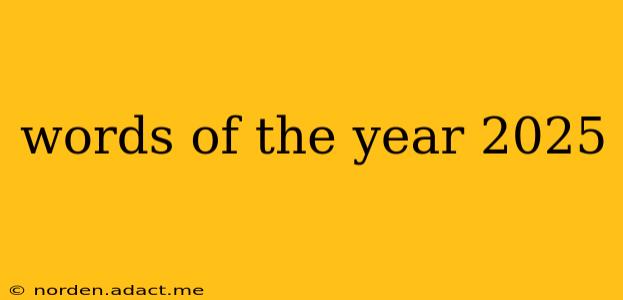Predicting the "Word of the Year" is always a fascinating, and somewhat precarious, exercise. It's a reflection of the zeitgeist, a snapshot of the cultural conversations dominating the year. While no one can definitively say what word will be crowned in 2025, we can analyze current trends and emerging issues to speculate on potential contenders. This exploration considers not only single words but also emerging phrases and concepts likely to shape our linguistic landscape.
What Makes a Word of the Year?
Before diving into predictions, let's consider the criteria typically used to select a "Word of the Year." Organizations like Merriam-Webster and Collins Dictionary consider factors such as:
- Frequency of Use: A significant increase in usage across various media outlets.
- Cultural Relevance: The word reflects major events, social movements, or technological advancements.
- Impact: The word captures a significant cultural shift or emotion.
- Longevity: The word's relevance is likely to persist beyond the current year.
Potential Contenders for Word of the Year 2025
Several themes are shaping our current discourse and could lead to words or phrases becoming prominent in 2025.
1. The Metaverse and Digital Identities
The ongoing development and integration of the metaverse are likely to spawn new vocabulary. Words related to virtual reality, augmented reality, digital avatars, and immersive experiences may contend for the title. We might see a surge in usage of terms like "metaverse citizenship" or "digital embodiment" reflecting the growing importance of online identities.
2. Climate Change and Sustainability
The urgency of climate action continues to intensify. Words highlighting environmental concerns and solutions are strong contenders. We might see words like "regenerative," "decarbonization," "eco-anxiety," or even a newly coined term related to climate resilience gain prominence. The focus is shifting from just "sustainability" to more active and transformative actions.
3. Generative AI and Technological Advancement
The rapid development of artificial intelligence, particularly generative AI, is reshaping numerous sectors. Words like "generative," "algorithmic bias," "synthetic media," and "AI ethics" might reflect the conversations around responsible AI development and its societal impact. We may even see entirely new terms emerge to describe specific AI technologies or their effects.
4. Mental Health and Wellbeing
Growing awareness of mental health continues to drive linguistic evolution. Words related to wellbeing, self-care, mindfulness, and specific mental health challenges may feature prominently. There's a possibility of a word or phrase emerging to encapsulate the collective mental health impact of specific events or societal pressures.
5. Geopolitical Shifts and Global Instability
The ongoing geopolitical landscape is dynamic and uncertain. Words reflecting global conflicts, political tensions, or economic upheaval could gain significant traction. Terms related to global security, energy independence, or supply chain resilience could reflect the evolving concerns of the international community.
Frequently Asked Questions (PAAs)
H2: What was the Word of the Year in previous years?
The "Word of the Year" varies across different organizations. Checking Merriam-Webster, Collins Dictionary, and other similar sources will provide insights into previous selections and their reasoning. Analyzing these past choices can reveal trends and anticipate future selections.
H2: How is the Word of the Year chosen?
The selection process typically involves analyzing large datasets of language usage, identifying words with significant increases in frequency, and evaluating their cultural significance and impact. Expert panels often review the data and discuss potential candidates before making a final decision.
H2: Does the Word of the Year accurately reflect public sentiment?
While the Word of the Year aims to capture the zeitgeist, it's not a perfect reflection of public sentiment. The selection process focuses on specific criteria, which may not encompass the full spectrum of public discourse. Nevertheless, it offers a valuable snapshot of prominent linguistic trends.
H2: What is the impact of the Word of the Year announcement?
The announcement of the Word of the Year often increases the visibility and usage of the chosen word. It can influence public discourse, shape media narratives, and even impact the way we think and talk about specific issues.
In conclusion, predicting the Word of the Year 2025 remains an exciting challenge. By closely monitoring evolving linguistic trends and societal issues, we can better anticipate the words that will shape our conversations and cultural understanding in the coming years. The themes outlined above provide a solid starting point for considering potential contenders, but ultimately, 2025 will reveal the linguistic victor.
